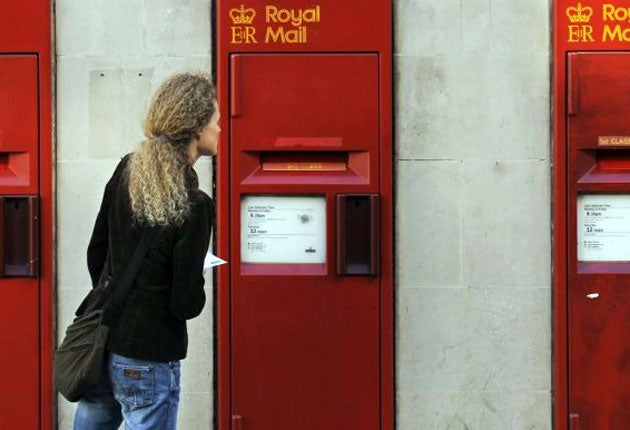Strike over Christmas would be a 'death wish', postal union told
Business leaders fear catastrophic damage to struggling economy

Your support helps us to tell the story
From reproductive rights to climate change to Big Tech, The Independent is on the ground when the story is developing. Whether it's investigating the financials of Elon Musk's pro-Trump PAC or producing our latest documentary, 'The A Word', which shines a light on the American women fighting for reproductive rights, we know how important it is to parse out the facts from the messaging.
At such a critical moment in US history, we need reporters on the ground. Your donation allows us to keep sending journalists to speak to both sides of the story.
The Independent is trusted by Americans across the entire political spectrum. And unlike many other quality news outlets, we choose not to lock Americans out of our reporting and analysis with paywalls. We believe quality journalism should be available to everyone, paid for by those who can afford it.
Your support makes all the difference.Furious industry leaders turned on postal workers last night, insisting a decision to strike nationally could have catastrophic consequences for an economy struggling to survive.
Small and online retail firms in particular could be crippled by "deplorable" industrial action at Royal Mail in the lead up to Christmas, a vital quarter in which many were hoping to see a traditional boost in sales make up for a dire year.
Yesterday members of the Communication Workers Union (CWU) backed a nationwide walkout in protest at the "imposition" of changes to working practices as well as cuts in their pay and job losses, following a spate of regional strikes which have led to huge backlogs of mail. Two thirds of almost 81,000 CWU members took part in the ballot, with 76.24 per cent voting in favour of strike action. It is not known when a strike would take place or how long it would last.
"At a time when businesses are taking drastic measures to keep as many people in employment as possible, the CWU's call for strike action in the run-up to the busy Christmas period is akin to a death wish," said Dr Adam Marshall, director of policy at the British Chambers of Commerce.
Politicians and business groups urged both sides to resolve the dispute and called for Government action, despite its refusal to intervene directly in the long-running row.
CWU Deputy general secretary Dave Ward agreed it was "unacceptable for the Government to sit on the sidelines", blaming it for many of Royal Mail's problems after introducing competition earlier than elsewhere in Europe. Union leaders are due to meet on Monday to decide on their next move and what possible form strike action could take, accusing Royal Mail of arrogance and running down the business.
"There's still an opportunity to reach an agreement before any national strike action takes place," said Mr Ward. "We need a national agreement which secures a fair deal on modernisation and reward for the efforts of postal workers in transforming the business. We want reassurances on job security, covering both redundancies and full-time/part-time ratios."
Royal Mail retorted by calling a planned strike "deplorable and irresponsible" and said it would drive customers away and undermine confidence in the industry. Managing director Mark Higson said: "It is clearly reprehensible for the union to continue to hold strikes when Royal Mail is not planning any further efficiency changes for the rest of the 2009 calendar year and the priority facing everyone in Royal Mail is to deliver the best possible service to customers in the run-up to Christmas. We call on the (CWU) to stop the strikes, get back round the table and talk."
Across Britain business were holding emergency talks yesterday to try to find a way around the problem. Many large companies such as Amazon, Lloyds Banking Group and British Gas, having endured the 2007 strike that crippled deliveries nationwide, said they had alternatives in place. Two years ago Royal Mail lost a contract worth £8m a year to deliver second class post for Amazon.
The Department of Health said it would expect trusts to have contingency plans so that patients were not affected and energy companies such as E.ON said they would be tolerant about payments as long as customers kept them informed.
Graeme Leach, chief economist at the Institute of Directors, said: "Postal workers need to understand they are shooting themselves in the foot."
Join our commenting forum
Join thought-provoking conversations, follow other Independent readers and see their replies
Comments